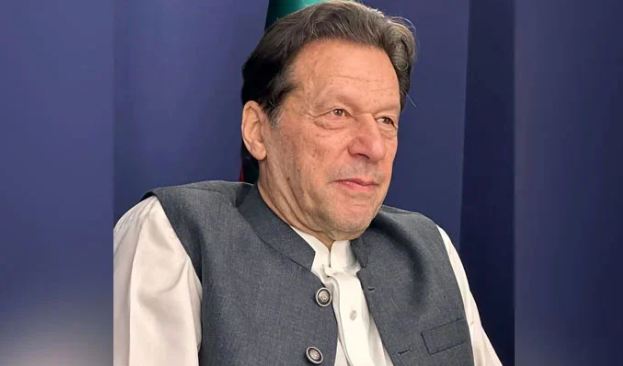ISLAMABAD: The Islamabad High Court (IHC) Tuesday issued a stay order against Pakistan Tehreek-e-Insaf (PTI) Chairman Imran Khan’s jail trial in the cipher case.
A two-member bench, comprising Justice Miangul Hassan Aurangzeb and Justice Saman Rafat Imtiaz, announced the decision during the hearing of the PTI chief’s intra-court appeal against trial in Adiala jail.
The development comes after the caretaker federal cabinet on Monday approved the jail trial of the former prime minister and PTI Vice Chairman Shah Mahmood Qureshi in the case.
The cabinet gave its assent to the summary by the Ministry of Law regarding the former prime minister and foreign minister’s trial in the Adiala jail due to security concerns.
During the hearing today, Attorney General Mansoor Awan presented his arguments before the court.
“The federal cabinet approved the jail trial of Imran Khan,” said the attorney general. He added that the notification will also be presented before the court.
At this, Justice Aurangzeb said that they would check the notification. “All trials will be held in open court, so this trial will be an extraordinary one,” he remarked.
“If this will be a jail trial then it would be an extraordinary one,” said the judge.
The attorney general said that this was not an extraordinary trial but just a jail trial, adding that he would seek records from all relevant agencies and place them before the court.
In hindsight, all three notifications are not in accordance with the relevant rules of the high court, the judge maintained.
“When, under what circumstances and on what basis was it decided that there would be a jail trial?” he asked Awan.
Khan’s counsel Raja told the court that five witnesses are still present in the jail to record their statements.
The judge remarked that many questions need to be answered, adding that the federal cabinet approved the jail trial two days ago.
“Why did the federal cabinet approve the jail trial?” he asked, while also questioning about the status of the court proceedings before approval.
The judge, during the hearing, remarked that there was a jail trial of Indira Gandhi’s murder case, but journalists from BBC and all other outlets were allowed to cover it.
The IHC then adjourned the hearing on the intra-court appeal against jail trial till November 16.
The deposed prime minister — who was ousted from office following a no-confidence motion in April last year — had moved IHC against the jail trial which was rejected by the court’s single bench on October 16.
IHC Chief Justice Aamer Farooq’s single-member bench announced no apparent malice behind conducting Khan’s jail trial in the cipher case. The court also directed him to approach the trial court if reservations persist.
Later, Khan filed an intra-court appeal against the single bench’s decision.
In August of this year, Khan and Qureshi were booked under the Official Secrets Act 1923 in the cipher case after the Federal Investigation Agency (FIA) invoked Section 5 of the said law.
The diplomatic cable reportedly went missing from Imran’s possession. According to the former ruling party, the cable contained a threat from the United States to topple the PTI’s government.
Khan and Qureshi have been indicted by the special court and are currently incarcerated in Adiala jail in the cipher case.
What is ciphergate?
The controversy first emerged on March 27, 2022, when Imran Khan — less than a month before his ouster in April 2022 — while addressing a public rally waved a letter before the crowd, claiming that it was a cipher from a foreign nation that had conspired with his political rivals to have PTI government overthrown.
He did not reveal the contents of the letter nor did he mention the name of the nation it came from. But a few days later, he accused the United States of conspiring against him and alleged that Assistant Secretary of State for South and Central Asia Affairs Donald Lu had sought his removal.
The cipher was about former Pakistan ambassador to the US Majeed’s meeting with Lu.
The former prime minister, claiming that he was reading contents from the cipher, said that “all will be forgiven for Pakistan if Imran Khan is removed from power”.
Then on March 31, the National Security Committee (NSC) took up the matter and decided to issue a “strong demarche” to the US for its “blatant interference in the internal affairs of Pakistan”.
Later, after his removal, then-prime minister Shehbaz Sharif convened a meeting of the NSC, which came to the conclusion that it had found no evidence of a foreign conspiracy in the cable.
In the two audio leaks that took the internet by storm and shocked the public after these events, the former prime minister, then-federal minister Asad Umar, and then-principle secretary Azam Khan could allegedly be heard discussing the US cipher and how to use it to their advantage.
On September 30, the federal cabinet took notice of the matter and constituted a committee to probe the contents of the audio leaks.
In October, the cabinet gave the green signal to initiate action against the former prime minister and handed over the case to the FIA.
Once FIA was given the task to probe the matter, it summoned Imran, Asad Umar, and other leaders of the party, but the PTI chief challenged the summons and secured a stay order from the court.
The Lahore High Court (LHC), in July this year, recalled the stay order against the call-up notice to Imran by the FIA.

















